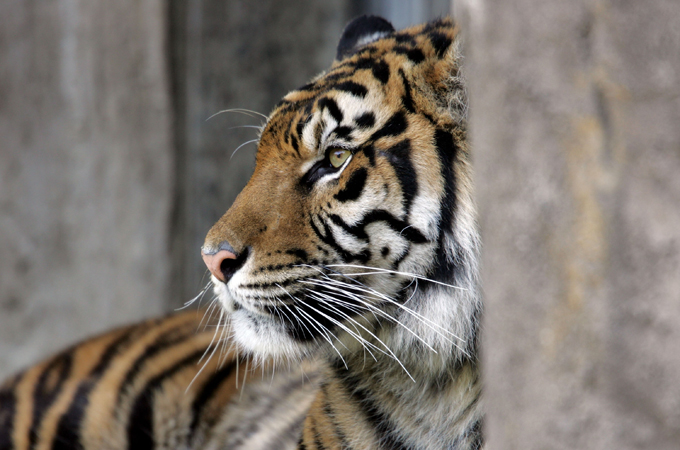Russia hosts summit to save tiger
Conservation groups say big cats could be extinct by 2022 unless hundreds of millions of dollars are spent.

 |
|
The big cats face extinction due to deforestation and illegal poaching [GALLO/GETTY] |
World leaders and wildlife campaigners are meeting in Russia to discuss raising the hundreds of millions of dollars needed to bring the tiger back from the brink of extinction.
The world’s first gathering of leaders from the 13 nations where tigers live in the wild was opened by Vladimir Putin, the Russian prime minister, in his home city St Petersburg.
Keep reading
list of 4 itemsAfter the Hurricane
World’s coral reefs face global bleaching crisis
Why is Germany maintaining economic ties with China?
The four-day summit is part of the Global Tiger Initiative, which was launched two years ago by World Bank President Robert Zoellick to save the endangered cat. The initiative says that the extinction of the tiger would represent “a historic, cultural, spiritual, and environmental catastrophe”.
“Wild tigers are not only a symbol of all that is splendid, mystical and powerful about nature,” the initiative said in a statement. “They are also a beacon of biodiversity, linking together the forests they inhabit and the natural resources and ecosystem services that their habitats produce for people.”
Charities and conservation groups warn that the species could be wiped out by 2022, the next Chinese year of the tiger, because of deforestation and illegal poaching.
Over the past century, the number of wild tigers has tumbled from 100,000 to just 3,200 today. At least three sub-species have already gone exinct and others could soon follow.
Millions needed
The World Bank estimates that it will take at least $350m to support nations’ joint efforts to fight poachers and introduce incentives for nature preservation over the next five years.
“This is an unprecedented gathering of world leaders (that aims) to double the number of tigers,” Jim Adams, vice-president for the East Asia and Pacific Region at the World Bank, said at the opening ceremony of the event.
“The global tiger initiative is an example of balanced economic development with nature preservation.”
But efforts to save the tiger will be met with several major challenges, not least due to the alleged medicinal qualities of tiger body parts used in traditional Asian therapies.
The tiger rescue efforts’ success “depends on the political will of the countries that support it,” WWF Director General James Leape told the conference.
The meeting is due to be attended by Wen Jiabao, the Chinese prime minister, and delegations from India and Bangladesh – the three nations with the largest volume of tiger skin and other organ trafficking.
But consensus on the need to save the tiger has been hampered by a lack of co-ordination on the ground to stop the trafficking of tiger parts such as paws and bones.
“Countries cannot fight the tiger trade individually because of the very nature of the trade,” said Sabri Zain of the TRAFFIC wildlife trade monitoring network.
“Tiger parts come from one country, are processed in another and consumed in a third,” Zain said.
Experts say that bringing India and China on board with efforts to save the tiger will be key to project’s success.
India is home to half of the world’s tiger population while the Chinese remain the world’s biggest consumers of tiger products despite global bans on their use.
“In China, things are going from bad to worse,” said Alexei Vaisman of the WWF. “But it is hard for the Chinese authorities, who are fighting against a millennium-old tradition.”